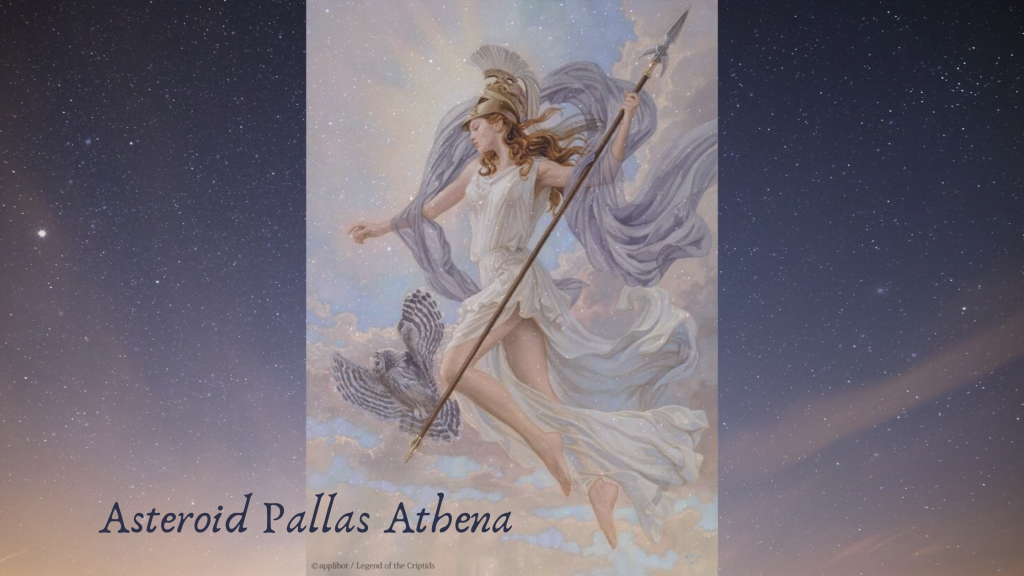Names: Athena (Greek), Pallas Athena (Greek), Minerva (Roman)
Asteroids: Pallas Athena (#2), Athena (#881), Minerva (#93)
Mythology: Goddess of wisdom, warfare, strategy, good counsel, and handicraft. Born from Zeus’ head. Protector of heroes.
Light Expression: Just, objective, strategic, brave, wise, strong craftsmanship, and talented at advising and pattern-finding. Able to see both sides of an argument and mediate calmly and dispassionately.
Shadow Expression: Promotes patriarchy. Judges and looks down upon women who exhibit feminine qualities. Detached from the inner mother, the wild nature, feminine emotions and intuition.
Exploration: Asteroid Pallas (#2) is named after the Greco-Roman goddess Pallas Athena (a.k.a. Athena). In mythology, Athena is the goddess of wisdom, strategy, justice, warfare, good counsel, and handicraft. In astrology, she therefore tends to be associated with these same qualities and attributes: innate wisdom, the ability to think objectively and strategically, talents around mediation, conflict resolution, and diplomacy, the ability to provide and receive good counsel and take a stand against injustice, and/or expertise in a craft (or wide range of crafts). However, there is more to her story.
According to mythology, Athena is born from her father Zeus’ (a.k.a. Jupiter’s) head. The backstory to this is that her mother, Metis (asteroid #9), was the original goddess of wisdom and Zeus’ first wife. An oracle prophesied that Metis would ultimately bear an heir who would overthrow Zeus. So to mitigate this risk, he swallowed Metis whole, not knowing she was pregnant with Athena at the time. Athena was thus born inside Zeus and when she was fully grown, came bursting through his head. Athena becomes Zeus’ favorite because he sees her as a child that is completely his own; that he birthed without a female counterpart. Similarly, Athena does not remember Metis and believes that she was born without a mother, so she often favors men over women and sides with the “father” (a.k.a. a patriarchal system) while supporting the devaluation of the “mother” in countless myths. In this way, those with prominent Pallas Athena placements may find that they resonate with men more than women, that they have a prominent (good or bad) relationship with their father, or that this side of Athena’s myth somehow seems to play out in their life.
To see if Pallas Athena’s myth is prominent in your astrological birth chart and psyche, see if she is making any major aspects (e.g. conjunction or opposition) to your luminaries (e.g. the Sun and Moon), planets (e.g. Venus, Saturn, etc.), OR to any significant dwarf planets (e.g. Ceres) or asteroids (e.g. Juno: #3) in your chart. It’s also helpful to look at Pallas’ sign, house, and other planetary aspects to better understand how she shows up in your personality, subconscious, and life experience. If asteroid Pallas is not significant in your chart, but you feel liker her myth is prominent for you, try looking up asteroids Minerva (#93) – the Roman name for Athena – and Athena (#881) to see if they play a larger part. If not, you may be experiencing her by progression, transit (personal or collective), solar arc, or in your solar return chart. Whatever you find astrologically, if you feel Athena’s presence in your life, it’s time to work with her myth, meditate on her light and shadow attributes, and see what she is hoping to awaken in you.
If you would like some guidance and support in understanding the Pallas Athena archetype, or other goddess archetypes, in your astrological chart and personal experience, feel free to reach out to me and we can do a goddess astrology reading, mentorship meeting, or archetypal coaching session to further explore her purpose in your life.

